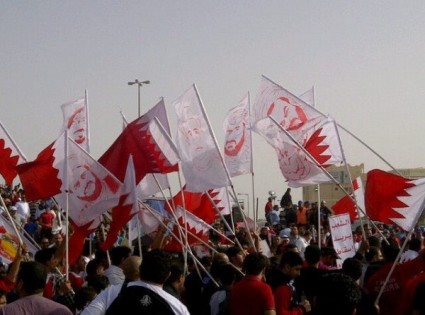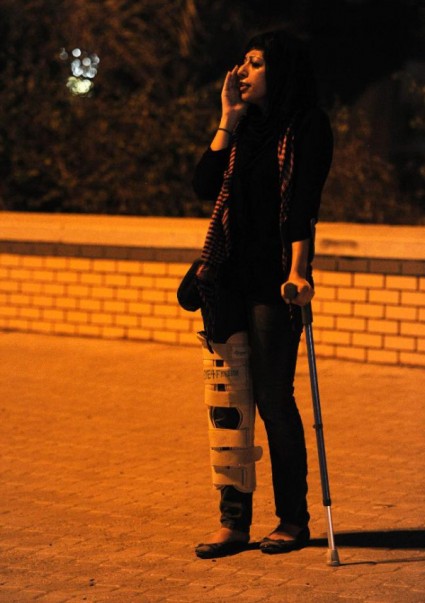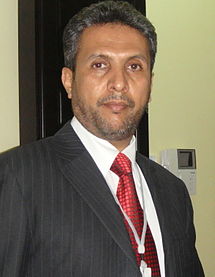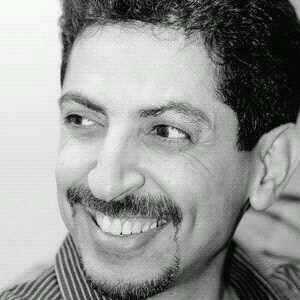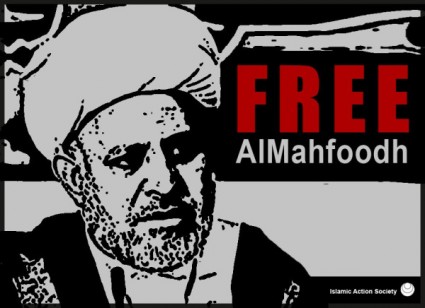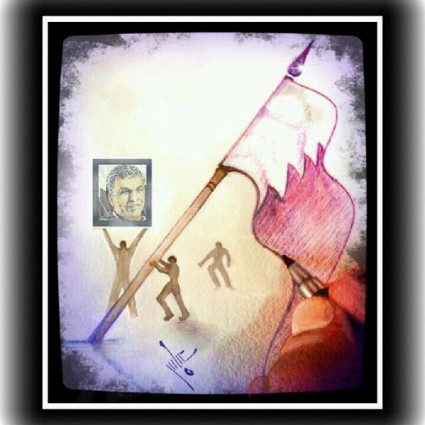Rula Al Saffar, The Bahraini medic who went to save lives and put her own in danger
A remarkable, moving story. Anyone following Bahrain should read this story, it will move your heart. Phlipn.
Everything is white: My heart, my clothes, and my hair
(1 of 6 parts) – Bahrain Mirror
Bahrain Mirror (Exclusive): The night before 14th February I browsed the Internet searching Facebook pages covering the hyped 14th February revolution, named “Day of Rage.” Back then Twitter was not widely popular as it is now. I was wondering: Is it going to be like the Tunisian and Egyptian revolutions? I was worried, my intuition told me something big and painful was coming to Bahrain, no doubt about that. And my intuition is usually right. I had a premonition: People would gather and a brutal security crackdown would come down on them without expecting it. How would it play out though, I did not know.
The Roundabout was Bahrain’s pulse
On the 15th of February, the first rally at the roundabout took place. I got there at three in the afternoon, and the protesters were still small in number. I parked my car close to the sidewalk of the roundabout. Moments later I started seeing hordes of people as the masses started coming from every angle. I was amazed and scared from a security assault. I moved my car close to Dana Mall. People of all ages, children, women, young men, the elderly, pregnant women, disabled, and others on wheelchairs. It was a magical ceremony that turned into reality. I could not take it all in, specially that it was happening in Bahrain. The Lulu roundabout monument turned into a magnet that pulled people to it; like the holy Kaaba in Mecca and the people were like the pilgrims that were visiting from all the towns and villages .
The large area around the flyover was filled with people, singing national songs, clapping, holdings hands that were moving like waves, and chanting slogans they had borrowed from countries that went through revolutions “The People want the downfall of the regime.” They hung banners bearing the same slogan. I was still overwhelmed by this dream, I didn’t expect the people of Bahrain to be in unity to this extent. This is a population that is brought together not by happiness by as much pain and misery, that made it go out and protest, especially after the fall of the first martyr. I decided not to go back home for lunch, but rather to work – to inspect the Resuscitation Room.
The next day my life took a different path. I was teaching in the Health Sciences Faculty, and finished around 7 or 8 in the evening. After that I would change into my jeans trousers and T – shirt and sports shoes, carry my white lab coat along with my dreams and concerns, and go straight to the roundabout. My life at home stopped, just as my social life did. The roundabout became the centre of my life. Where my heart, and hopes, were. There I would smell sweet freedom. The idea came up to set up a medical tent there. Our first concern was people’s health and safety. It was the first tent that was erected in the area. It was fitted with equipment under the supervision of medical volunteers. Dr Mariam Al Jalahma allowed the disbursement of medicine (I have a written document of that). We worked on educating people about health, blood sugar and high pressure symptoms, and car accidents. I was walking on air – excited and ecstatic that I would not feel tired. I found myself in my real profession, volunteer work that I am passionate about. I would even call my friends at the hospital, asking them if they needed my assistance I would be available here and there, one foot was here, and the other was there .
Thursday’s Wound
Medical staff demonstration to Lulu roundabout
On the 17th of February at 6:30 am I arrived at the Faculty of Health Sciences where I taught. I didn’t hear about the bloody crackdown yet. On my way to Salmaniya hospital the roads were empty and quiet. I got to the college, and went directly to my office and prepared coffee. Then I went to inspect – the students had not arrived and the classes were empty. I received a call from the Emergency medical team saying “Leave the college and come here, the roundabout has been attacked.” I went back to my office, changed into my roundabout gear, and my white coat over it. I got to the emergency unit and saw that the number of staff is enough, so I went to help the paramedics. I called the medical tent “how is the situation?” They replied “Come here and get first aid.” I got into the ambulance with the things they asked for. I went there to see a sight that put me in shock; a hurricane of chaos, clouds of tear gas, the sounds of stun grenades, and yelling. I got out of the ambulance to face that flurry, and out of haste I fell on my knees with the equipment. Someone helped me and quickly took me to his car to protect me. He got me in the car but I yelled “let me out! let me go! I want to help the people .” …more
September 25, 2012 No Comments
Americans Sour on Endless War
The Right thinks it has a winning issue in mocking President Obama for “leading from behind” on international crises like last year’s uprising in Libya. But a new study finds Americans leery of more war, supportive of diplomacy and eager for less military spending, says Lawrence S. Wittner.
Americans Sour on Endless War
25 September, 2012 – By Lawrence S. Wittner – Consortinumnews.com
In the midst of a nationwide election campaign in which many politicians trumpet their support for the buildup and deployment of U.S. military power around the world, the American public’s disagreement with such measures is quite remarkable. Indeed, many signs point to the fact that most Americans want to avoid new wars, reduce military spending, and support international cooperation.
The latest evidence along these lines is a nationwide opinion survey just released as a report (“Foreign Policy in the New Millennium”) by the Chicago Council on Global Affairs. Conducted in late May and early June 2012, the survey resulted in some striking findings.
A U.S. soldier in Afghanistan fires an MA-2, .50-caliber machine gun, in a training exercise at the U.S. base in Afghanistan’s Farah province on Sept. 22, 2012. (Photo credit: U.S. Defense Department photo by Staff Sgt. Jonathan Lovelady)
One is that most Americans are quite disillusioned with the wars in Iraq and Afghanistan during the past decade. Asked about these conflicts, 67 percent of respondents said they had not been worth fighting. Indeed, 69 percent said that, despite the war in Afghanistan, the United States was no safer from terrorism.
Naturally, these attitudes about military intervention in Iraq and Afghanistan fed into opinions about future military involvement. Eighty-two percent of those surveyed favored bringing U.S. troops home from Afghanistan by 2014 or by an earlier date. Majorities also opposed maintaining long-term military bases in either country. And 71 percent agreed that “the experience of the Iraq war should make nations more cautious about using military force to deal with rogue states.”
Certainly Americans seem to believe that their own military footprint in the world should be reduced. In the Chicago Council survey, 78 percent of respondents said that the United States was playing the role of a world policeman more than it should. Presented with a variety of situations, respondents usually stated that they opposed the use of U.S. military force.
For example, a majority opposed a U.S. military response to a North Korean invasion of South Korea. Or, to take an issue that is frequently discussed today – Iran’s possible development of nuclear weapons – 70 percent of respondents opposed a U.S. military strike against that nation with the objective of destroying its nuclear facilities.
Yes, admittedly, a small majority (53 percent) thought that maintaining superior military power was a “very important goal.” But this response was down by 14 points from 2002. Furthermore, to accomplish deficit reduction, 68 percent of respondents favored cutting U.S. spending on the military – up 10 points from 2010.
Nor are these opinions contradictory. After all, U.S. military spending is so vast – more than five times that of the number-two military spender, China – that substantial cuts in the U.S. military budget can be made without challenging U.S. military superiority.
It should be noted that American preferences are anti-military rather than “isolationist.” The report by the Chicago Council observes: “As they increasingly seek to cut back on foreign expenditures and avoid military entanglement whenever possible, Americans are broadly supportive of nonmilitary forms of international engagement and problem solving.” These range from “diplomacy, alliances, and international treaties to economic aid and decision making through the UN.”
For example, the survey found that 84 percent of respondents favored the comprehensive nuclear test ban treaty (still un-ratified by the U.S. Senate), 70 percent favored the International Criminal Court treaty (from which the United States was withdrawn by President George W. Bush), and 67 percent favored a treaty to cope with climate change by limiting greenhouse gas emissions.
When asked about China, a nation frequently criticized by U.S. pundits and politicians alike, 69 percent of respondents believed that the United States should engage in friendly cooperation with that country.
The “isolationist” claim falls particularly flat when one examines American attitudes toward the United Nations. The Chicago Council survey found that 56 percent of respondents agreed that, when dealing with international problems, the United States should be “more willing to make decisions within the United Nations,” even if that meant that the United States would not always get its way.
Overall, then, Americans favor a less militarized U.S. government approach to world affairs than currently exists. Perhaps the time has come for politicians to catch up with them! …source
September 25, 2012 No Comments
Free All Political Prisoners and Prsoners of Conscience
September 25, 2012 No Comments
Free Ibrahim Sharif al-Sayed
September 25, 2012 No Comments
Free Zainab Al-Khawaja
September 25, 2012 No Comments
Free Mahdi Abu Deeb
September 25, 2012 No Comments
Free Al-Khawaja
September 25, 2012 No Comments
Free AlMahfoodh
September 25, 2012 No Comments
Free Rajab
September 25, 2012 No Comments
Bahrain: Human Rights and Political Wrongs
Bahrain: Human Rights and Political Wrongs
25 September, 2012 – Toby Jones – sada
In response to pointed criticism from the United Nations Human Rights Council, representatives of the Bahraini government claimed they would accept and implement over 150 of the council’s recommendations for the improvement of human rights and the treatment of prisoners. Foreign Minister Khalid bin Ahmed Al Khalifa remarked that “Our actions, more than our words, should dispel any doubts regarding [Bahrain’s] commitment to upholding human rights through the rule of law.” Despite this, there are real reasons to be skeptical that Manama is ready to turn the page. The government is certainly interested in pushing a more progressive image abroad, but the truth at home is that authorities remain committed to pursuing a hardline political agenda that invariably involves sustained suppression of activists.
For one, the crackdowns have only increased. In April 2011, police arrested, tortured, and subsequently sentenced Abd al-Hadi al-Khawaja, a dual citizen of Bahrain and Denmark, to life imprisonment. Though Khawaja had garnered considerable popularity for his criticism of the royal family (and of the prime minister, Khalifa bin Salman Al Khalifa, especially), his primary commitment had long been to the protection and advocacy of human rights—working to draw international attention to various abuses inside Bahrain. In July, Khawaja’s longtime friend and collaborator, Nabeel Rajab, was arrested and detained for criticizing the country’s leadership on Twitter—eventually being charged with organizing illegal protests and sentenced to three years’ imprisonment. Rajab’s appeal is scheduled to be heard in late September. Abd al-Hadi’s daughter, Zaynab al-Khawaja, was also detained in early August for participating in protests, and has taken considerable public risks in an effort to draw attention to regime brutality; as a result, she has faced periodic arrests over the last eighteen months and multiple charges that could keep her in prison for years.
As a consequence, Nabeel Rajab, the Khawajas, and other key human rights defenders have increasingly come to enjoy widespread popularity and significant political capital. This development of these new players deeply discomfits the government. The government has already deeply politicized the issue of human rights over the last year and a half; since early 2011 the regime has sought to use the uprising as a pretext for punishing its long-time political adversaries. Authorities moved early last year to round up what it considered its most contentious opponents—including Ebrahim Sharif, Abd al-Jalil Singace, Hassan Mushaima, Abd al-Wahab Hussein and others—and almost all outspoken opposition leaders. They justified their detentions as the result of the activists’ “radicalism”—a fictitious claim which served to undermine organizations that could rally a popular movement and constitute the most immediate threat to the regime’s survival.
What is remarkable, however, is that these new activities are not affiliated with the country’s mainstream political opposition societies—such as Al Wefaq or Haq. Whereas Al Wefaq and others have admirably sought (but nevertheless failed) to negotiate an end the crackdowns, Rajab and the Khawajas have remained committed to holding officials accountable and seeking justice for those traumatized and victimized since the uprising began, proving considerably more adept than the formal opposition at drawing international attention. In the absence of more credible leaders, Rajab and the Khawajas have become de facto symbols of popular opposition and for a platform that blends political opportunity with social justice. Along with well-known collaborators Said Yusuf al-Muhafda and Alaa Shehabi, both of whom have also faced periodic arrest, they have helped bring attention to both the government’s abuses and the ongoing resilience of opposition forces. Because they too have been subjected to abuse, their continued commitment to reporting events and supporting calls for accountability have also had the effect of inspiring protesters to carry on. While none of them have sought the kind of authority that comes with office, they have nevertheless become key political icons for much of the country’s restive community. Considering this high visibility and international rapport, perhaps it was just a matter of time before they landed in Bahrain’s dungeons. …more
September 25, 2012 No Comments
Obama calls for Syria sanctions and end to Assad rule
Obama calls for Syria sanctions and end to Assad rule
25 September, 2012 – Agence France Presse – The Daily Star
UNITED NATIONS, Sept 25, 2012 (AFP) – US President Barack Obama on Tuesday demanded “sanctions and consequences” for atrocities in Syria and said President Bashar al-Assad’s rule must come to an end.
“The future must not belong to a dictator who massacres his people,” Obama told the UN General Assembly in a keynote address.
“If there is a cause that cries out for protest in the world today, it is a regime that tortures children and shoots rockets at apartment buildings.”
He told leaders at the UN headquarters: “As we meet here, we again declare that the regime of Bashar al-Assad must come to an end so that the suffering of the Syrian people can stop, and a new dawn can begin.”
Obama also warned that the international community must act to prevent the 18 month old uprising against Assad turning into “a cycle of sectarian violence.”
He said the United States wants a Syria “that is united and inclusive; where children don’t need to fear their own government, and all Syrians have a say in how they are governed — Sunnis and Alawites; Kurds and Christians.”
“That is the outcome that we will work for — with sanctions and consequences for those who persecute; and assistance and support for those who work for this common good,” Obama said.
“We believe that the Syrians who embrace this vision will have the strength and legitimacy to lead.”
Syria is one of the key topics at the UN assembly with growing western calls for action against Assad. Russia and China have vetoed three UN Security Council resolutions which could have led to sanctions.
September 25, 2012 No Comments
US drone attacks are terrorism
US drones “terrorize” communities: Report
25 September, 2012 – Al Akhbar
The US government’s drone program in Pakistan “terrorizes” local communities, kills large numbers of civilians and drives anti-American fervor in the country, a new study by the law schools of Stanford and New York University finds.
The study, titled “Living Under Drones,” finds that Pakistanis living in affected areas are afraid to attend public gatherings such as weddings and funerals as ground operators that guide the unmanned aircraft frequently mistake them as groups of al-Qaeda-linked fighters.
“Their presence terrorizes men, women, and children, giving rise to anxiety and psychological trauma among civilian communities,” the study reads. “Those living under drones have to face the constant worry that a deadly strike may be fired at any moment, and the knowledge that they are powerless to protect themselves.”
It adds: “These fears have affected behavior. The US practice of striking one area multiple times, and evidence that it has killed rescuers, makes both community members and humanitarian workers afraid or unwilling to assist injured victims.”
The study is based on interviews with victims, witnesses, humanitarian workers and medical professionals compiled over a nine-month period.
Drone attacks began being carried out in Pakistan under former US President George W. Bush, but the policy has been popularized under Barack Obama despite previous reports that they lead to a high number of civilian casualties.
There has been a dramatic increase in US drone strikes in Pakistan since May, when a NATO summit in Chicago failed to strike a deal to end a six-month blockade on convoys transporting supplies to coalition forces in Afghanistan.
This most recent study cites figures compiled by the Bureau for Investigative Journalism that finds between 2,562 and 3,325 people were killed in Pakistan between June 2004 and mid-September this year. Among them, between 474 and 881 were civilians, including 176 children.
In addition to the deaths, the bureau estimates that 1,300 people were injured in drone attacks in the same period.
It also refutes US claims that the drone program has made Americans safer through the targeted assassinations of dangerous militants.
“The dominant narrative about the use of drones in Pakistan is of a surgically precise and effective tool that makes the US safer by enabling ‘targeted killings’ of terrorists, with minimal downsides or collateral impacts. This narrative is false,” the report states. …more
September 25, 2012 No Comments
Familar pattern of intensified assaults, night raids by regime follows pronounced International criticism of human rights failures
Bahrain: Assaults and night raids just days after the Geneva session
25 September, 2012 – ABNA
(Ahlul Bayt News Agency) – The regime in Bahrain is escalating its security measures by increasing the pace of house raids and arrests just days after holding the United Nations Human Rights Council to discuss the violations in Bahrain.
This comes after the international community demanded to fully respect the basic human rights of the Bahraini citizens. However, the regime chose to respond swiftly by increasing the number of house raids in different areas around Bahrain.
These raids usually take place at late night or very early morning to terrify the households causing psychological problems especially to children and elderly.
The raids are usually also carried out without presenting arrest warrants. Still, even if there is a warrant it is illegal to terrify the people by breaking doors and vandalizing and stealing private belongings of households, insulting their religious believes, along with both verbal and physical assaults. Such behavior has become a typical conduct of the regime forces when dealing with citizens.
Lack of accountability encourages the regime forces to commit more crimes which are believed to be commands of high ranking officials. Impunity, gives them the chance to commit more violations against pro-democracy citizens who are being punished for their insistence on a democratic transition.
September 25, 2012 No Comments
The Powerplays behind “The Innocence of Muslims”
The Powerplays behind “The Innocence of Muslims”
by Thierry Meyssanv – Voltaire Network – Damascus (Syria) – 25 September, 2012
Israel’s big ploy moves ahead in the shadow of the demonstrations and reactions to the film “The Innocence of Muslims.” However, the appearance of Hezbollah on the scene has reversed the situation, which could prompt Tel Aviv to call off the operation.
The international reactions to the film by “Sam Bacile” are more and more incomprehensible if taken at face value, ignoring who is behind it and what their objectives are.
This provocation designed to instigate a clash of civilizations is very different from previous ones. It’s goal is not to stigmatize Islam vis-à-vis Western populations to elicit hatred toward the Muslims but is rather directed at Muslims to insult them and thereby incite hatred toward Westerners. This is not “Islamophobia”; it is “Islam-bashing” and its objective is to arouse anger among Muslims and direct that anger toward specific targets: those who in the U.S. or among their allies wish to interrupt the cycles of wars begun on September 11, 2001.
No one knows if the film, “The Innocence of Muslims,” really exists in full-length form. So far, only a thirteen-minute clip has emerged, the most offensive parts of which were dubbed over the soundtrack at a later date. First placed on YouTube, the video had no impact until it was diffused in Arabic by the Salafist television station, Al-Nas. Salafist groups then reacted violently but instead of attacking the station or its Saudi sponsors, they turned their ire on American diplomatic representatives.
The State Department was warned on September 9—two days before the release of the film by the Salafist television station—that several of its embassies would be attacked on the 11th. Yet this alert was not taken seriously and diplomatic personnel were not informed of the threat. The State Department had been expecting anti-American demonstrations to take place to mark the anniversary of the September 11th attacks.
It has since been established that behind the Benghazi mob, a commando was already prepared to attack the Consulate and then the fortified villa which was to be used as a safehouse in the case of a serious crisis.
The target of the operation was the U.S. Ambassador to Libya, Chris Stevens. This specialist in Near-Eastern Affairs was known both for his American imperialist views but also his anti-Zionist ones. This was confirmed by the special Palestinian negotiator Saeb Erekat as he deplored the death of a diplomat who had done much to comprehend the point of view of the Palestinian people and in turn make that viewpoint understood in Washington.
A second target was to be designated to punish France for having aligned herself with U.S. positions. Paris, in fact, refuses to let itself be dragged into a war against Iran and also refuses to get itself more deeply enmeshed in the Syrian quagmire. Consequently, a whole new provocation was launched, employing a satirical magazine that has for years relayed the Neo-conservative viewpoint within the French Left. Anticipating the consequences, France immediately suspended activity at twenty of its embassies and deployed heavy security around them.
At home, the French government presented itself as the guarantor of the freedom of expression. Accordingly, it defends the right of the enemies of Islam to indulge in blasphemous caricatures. But then, openly contradicting itself, the same government announced a prohibition of any demonstration hostile to the film or the magazine, thus denying freedom of expression to the defenders of Islam.
In the French tradition, freedom of expression is considered a foundational condition of democracy. It therefore is accompanied with prohibitions against libel and defamation seen as threatening to democratic debate. The main characteristic of “Innocence” is that it has no connection to historical reality and presents no critique of Islam. It is entirely composed of defamatory scenes. However, libel is not a human right. …more
September 25, 2012 No Comments
Bahrain Protests intensify in Manama
Protesters, police clash in Bahrain’s capital
25 September, 2012 – Bahrain Freedom Movement
AP – Witnesses in Bahrain say riot police have clashed with anti-government protesters seeking to shift their demonstrations to the heart of the Gulf kingdom’s capital.
Security forces fired tear gas and stun grenades in street battles near the historic markets and narrow streets in the center of Manama.
The clashes Friday mark the second such violence in Manama in the past month as Shiite-led protesters try to rattle the Sunni monarchy by bringing rallies back into the capital. Most clashes in recent months have occurred in outlying areas.
More than 50 people have been killed in unrest since February 2011 between Bahrain’s Western-backed rulers and majority Shiites seeking a greater political voice. …source
September 25, 2012 No Comments
Ban Ki-moon Posits: proxy war in Syria a threat World Peace, agitators must clean up their mess
Syria ‘calamity’ a threat to world peace: Ban
25 September, 2012 – Agence France Presse
UNITED NATIONS: UN leader Ban Ki-moon said Tuesday that the Syrian civil war is a “calamity” that now threatens world peace and demands action by the divided UN Security Council.
Ban told the opening of the UN General Assembly that the Syria conflict “is a regional calamity with global ramifications” that needs action by the Security Council.
“The international community should not look the other way as violence spirals out of control,” Ban told world leaders, adding that “brutal” rights abuses were being committed by President Bashar al-Assad’s government.
“I call on the international community — especially the members of the Security Council and countries in the region — to solidly and concretely support the efforts” of UN-Arab League envoy Lakhdar Brahimi.
“We must stop the violence and flow of arms to both sides and set in motion a Syrian-led transition as soon as possible,” Ban added.
The 15-nation Security Council has become paralyzed by deadlock over the 18-month-old deadlock which Syrian activists say has left more than 29,000 dead.
Russia, Assad’s main ally, and China have vetoed three Security Council resolutions which could have led to sanctions against the Syrian government.
Ban said the crimes being committed in Syria must not go unpunished. “There is no statute of limitations for such extreme violence,” he insisted.
“It is the duty of our generation to put an end to impunity for international crimes in Syria and elsewhere.”
Ban said he wanted his address to the 193-member UN to “sound the alarm about our direction as a human family.”
The UN secretary general condemned governments which spend “vast and precious funds on deadly weapons” at a time of growing climate change, economic crisis and growing poverty.
He warned that “the door may be closing for good” on chances of creating separate Palestinian and Israeli states because of the growth of Israeli settlements in the occupied territories.
“We must break this dangerous impasse,” he said.
Ban called the anti-Islam Internet video which has inflamed protests across the world “a disgraceful act of great insensitivity” which he said had caused “justifiable offense and unjustifiable offense.”
“I am profoundly concerned about continued violence in Afghanistan and in the Democratic Republic of Congo,” he said.
“The crisis in the Sahel is not getting sufficient attention and support.”
“Poverty, fragility, drought and sectarian tensions are threats to stability across the region,” Ban said. “Extremism is on the rise,” he warned, referring to the Islamists who have seized northern Mali.
September 25, 2012 No Comments
Obama Postures for Election bid, warns Iran on Nukes while Iran maintain program is peaceful
Obama warns Iran on nuclear bid, containment ‘no option’
25 September, 2012 – By Matt Spetalnick, Mark Felsenthal – Reuters
NEW YORK: President Barack Obama will warn Iran Tuesday that the United States will “do what we must” to prevent it acquiring a nuclear weapon, and appeal to world leaders for a united front against further attacks on U.S. diplomatic missions in Muslim countries.
Preparing to take the podium at the United Nations six weeks before the U.S. presidential election, Obama hopes to counter criticism of his foreign record by Republican rival Mitt Romney, who has accused him of mishandling the Arab Spring uprisings, damaging ties with Israel and not being tough enough on Iran.
Seeking to step up pressure on Iran, Obama will tell the U.N. General Assembly that there is still time for a diplomacy but that “time is not unlimited,” according to advance excerpts of his speech, due to begin sometime around 1315 GMT.
His tough talk appears aimed at easing Israeli concerns about U.S. resolve to curb Tehran’s nuclear drive, as he reasserts before the world body that he will never let Iran develop an atomic bomb and then simply contain the problem.
But he will stop short of meeting Israeli Prime Minister Benjamin Netanyahu’s demand to set a clear “red line” that Iran must not cross if it is to avoid military action.
“A nuclear-armed Iran is not a challenge that can be contained,” he will say. “It would threaten the elimination of Israel, the security of Gulf nations and the stability of the global economy …
“The United States will do what we must to prevent Iran from obtaining a nuclear weapon.”
Obama is also seeking to reassure voters that he is doing everything he can to head off any more violence like the Sept. 11 attack in Libya that killed the U.S. ambassador and three of his colleagues.
…more
September 25, 2012 No Comments

